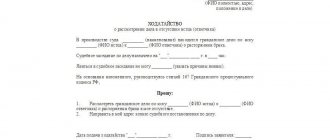⭐ ⭐ ⭐ ⭐ ⭐ Hello everyone, if you are not yet familiar with our materials, they are concise and contain only the necessary information, so you can always quickly understand any issue. Today we will cover a topic such as: Does Registration in an Apartment Affect a Divorce? Most likely, you think that this is complicated and incomprehensible, but we will explain it in simple language, so that you do not have any additional questions. But if you still have a misunderstanding of the material presented, then our duty lawyer will advise you in any convenient way.
From privatized housing purchased by one family member before marriage, it is very easy to write out your ex-spouse after a divorce. It is enough to submit a statement of claim to the court and attach documents confirming full ownership of this property. The court makes a decision to evict not only the ex-spouse, but also his relatives (parents, brothers, sisters), if they were registered in the apartment.
The desire to evict a spouse from his own apartment upon divorce is completely justified and relevant. After a divorce, the couple loses their existence, they no longer live together, but the legal burdens associated with registration remain.
Discharge of a minor child
Realtors strictly monitor how many people are registered and actually live in an apartment that comes on the real estate market. It is unlikely that anyone will want to purchase housing in which a stranger is registered, whose whereabouts are unknown.
- Residence of the mother according to the child's registration during a divorce.
- After a divorce, can my husband discharge me even when I was 17 when I registered?
- Hello, is it necessary to register the defendant in a divorce?
- What rights does registration in emergency housing owned by my wife give me in the event of a divorce?
- Can a mother, during a divorce, live at the place of registration of the child?
- Housing during divorce
- Agreement on children in case of divorce
- Share in an apartment during a divorce
- Apartment during divorce
- Division of property during divorce
If the child is registered with the father during a divorce
When figuring out what a child can claim after a divorce, you need to take into account that the process of dividing real estate will largely depend on the share received by the parents and their children during the privatization of the property. If only the husband took part in the procedure, he will be the sole owner of the property. In this situation, the premises are acquired through a gratuitous transaction. The process is carried out in compliance with the provisions enshrined in Article 34 of the RF IC.
If spouses divorce, the issue of dividing the apartment and children becomes the most controversial. Usually a minor citizen is left to live with his mother. However, if the child is registered with the father during a divorce , this may cause additional difficulties. In this situation, a man is able to begin to lay claim to the sole upbringing of his offspring. The citizen is confident that the court will side with him in this situation. In practice, the issue is not resolved quite this way.
Questions regarding child registration if the parents are unmarried or divorced
- The Civil Code of the Russian Federation states in Article 20 that a minor under 14 years of age must be registered exclusively with his parents;
- The RF IC defines fundamental rights, also supported by the UN Convention on the Rights of the Child;
- The Code of Administrative Offenses imposes a fine on those parents who did not register their child at their place of residence on time.
Can an ex-husband register his child? Undoubtedly, a father has the right to register his own child with him even after a divorce from his wife. This procedure will not be complicated by any nuances associated with divorce.
The child is registered with the father of the mother's rights in case of divorce
Our son-in-law removed the child from his three-room comfortable apartment in a new building very simply - together with him to his mother in a private house with much worse conditions (a cold, dark and damp adobe hut). At the same time, I didn’t even intend to sell it. The guardianship authorities did not participate in this process in any way. The mother was registered with her parents and learned about her husband’s actions only six months later during the divorce.
The most important thing is to be aware of your actions and completely immerse yourself in the procedure, carefully thinking through each stage. Good luck to you in this difficult matter and remember that any government procedure requires your attention and accuracy in your actions.
How to divide an apartment during a divorce if there are children
Moving from a modern apartment in a metropolis to a country house may raise questions among guardianship authorities regarding the feasibility of such an exchange.
In this case, parents should provide evidence of improved living conditions (documents about a larger area of the house, confirmation of its improvement, doctor’s recommendations about changing the child’s climate, etc.). Property acquired for children or registered in their name is not subject to accounting when dividing jointly acquired assets. These are their personal belongings and it does not matter which spouse acquired this property and with what funds.
Does the mother or father have the right to live at the place of registration of the child after a divorce?
The ideal solution would be a court decision for the man to purchase separate housing for the remaining members of his former family. In this case, the mother will not have problems with her own registration and registration of children. This rule also applies to the mother’s ability to live (the right to use residential premises) if her offspring is registered there.
The law establishes that minors have the right to move in with the owner of a residential premises without his consent if the mother legally lives there. But the mother cannot move in with her ex-husband, where their children are registered. The owner has the right to evict the mother of the registered children after a divorce.
Child and divorce: important tips for parents
- Real assessment of the situation . It is important to analyze the current situation and understand what exactly the child wants to achieve. His goal can be serious, or it can be an elementary whim. Indulging the latter and constant concessions are unacceptable.
- Staying calm and confident . It is necessary to choose a clear position and strictly adhere to it. The dialogue with the child should be conducted in a calm tone, presenting arguments and a rational explanation of your vision of the situation.
- Search for constructive solutions and compromises . The best way out of a difficult situation will be a jointly made decision through mutual concessions and agreements.
- Ignoring . At the first stage of manifestation of a whim or hysteria, simply do not pay attention to the child’s behavior. As soon as his emotional state returns to normal (and when using this technique this will happen quite quickly), it is necessary to explain himself and tell him why he cannot behave this way in the future.
- Switching the child's attention , changing the topic.
- Calm the child down and set him up for a confidential conversation, during which to find out his true intentions and the reasons that prompted him to manipulate the parent.
- Listen and understand your child . If he understands that he cannot reach his parent, he begins to resort to various tricks just to earn attention and favor.
- Tell your child about your feelings and experiences. Make it clear that his behavior is distressing and alarming.
- Do not hide that the manipulation on the part of the child has been revealed, and explain that his cunning plan has been revealed.
The child is registered with the father with the rights of the mother
If the child was registered in a non-privatized apartment, then later, when it is privatized, he automatically receives a share of this residential premises, usually equal to the shares of all other owners, and possibly even greater.
Every married person knows: anything can happen in family life. Sometimes the situation develops in such a way that a child needs to be registered at a time when what seemed to be an eternal and indestructible family, in an instant, at the request of one of the spouses, turned into an incomplete one. Registration during a divorce is a matter full of legal subtleties.
We recommend that you read: Monthly child care allowance 2020
Five reasons why a child may be left with his father after a divorce
- When the mother, due to mental, health or lifestyle reasons, is unable to take care of the children;
- Regular manifestation of aggression towards the child, physical and mental violence on the part of the parent;
- The mother's leading an immoral, asocial lifestyle;
- She lacks a place to live with her children;
- Lack of funds for their maintenance.
All arguments must be supported by evidence: certificates from government agencies and medical institutions, characteristics, expert opinions, testimony of witnesses and others.
The child is registered with the father of the mother's right of residence in the event of a divorce
Until a certain time, the baby was registered in the apartment with his dad. If the mother agrees to change the child’s registration and is ready to submit a corresponding application, then he, by re-registering with the mother, vacates the father’s apartment from registered residents.
The court decision on the child living with the mother does not matter if the mother is not registered in this apartment. Living with the child's mother means that the child must live in the same place where the child's mother is registered. If the apartment is owned by the father and mother-in-law, based on a court decision, they may well demand through the court to remove the child from this apartment, and demand that the mother register him with her.
Application to the judiciary
Is it possible to file an application for divorce in a court other than your place of registration? Let’s take a closer look. Submission of a document to the court is carried out in the general manner:
- collection of documentation;
- preparing a claim;
- payment of court fees;
- sending documents to the judicial authority;
- attending the proceedings;
- obtaining a decision;
- registration of the dissolution of the union in the registry office.
The initiator sends an application:
- at the place of permanent registration of the second party;
- at the place of the defendant’s last place of residence known to the initiator;
- at the location of the main property of the second spouse.
Thus, the plaintiff’s registration is not relevant to filing an application for divorce.
If it is impossible for the plaintiff to attend the court hearing at the place where the application was sent, then after accepting the claim for consideration, he can send a petition to consider the issue without his personal participation or send a proxy. The presence of a representative is advisable when deciding on the place of residence of a minor child or the division of joint property.
Important! If the spouses do not have additional claims against each other, an application for consideration without a plaintiff is sufficient. In this case, the defendant can send a written response to the applicant’s demands and agree to register the divorce.
The child’s rights to the father’s apartment and living in it after divorce
During a divorce, the division of property depends on the share received during the privatization of housing. If the apartment was privatized by one husband, then he is its sole owner. If the offspring participated in the process, he is the owner along with the husband, since housing is purchased under a free transaction (in accordance with the provisions of Article 34 of the RF IC).
If the baby is registered in state housing, then you can fight in court for living in it if the spouses cannot reach an agreement. A spouse cannot remove a child from a non-privatized apartment after a divorce.
Does registration affect the division of property?
Without your consent to refuse privatization, registration of ownership will not be possible. Good afternoon I am the sole owner of the apartment. I recently registered my boyfriend to live with me. I heard that after 3 years with permanent registration, he will be able to claim my housing in the future...is this true? And can I write him out myself without his consent in this case?
How to divide property during a divorce in Ukraine 2020: all the subtleties
The same as for the living tenant. It is very easy to register, despite the seemingly large list of documents. Deregistration will be more difficult, especially for the apartment owner. This, of course, is not a reason to isolate yourself from relatives and loved ones - this is a reason to seriously think and discuss the situation before starting any transactions. Get new comments by email. You can subscribe without commenting. Leave a comment. Even in the case of housing under a social tenancy agreement, citizens registered in it have equal rights, including the right to residence, in accordance with the requirements of the Housing Code of the Russian Federation.
We recommend reading: How to Find Out Which Common Antenna Is In A House By Address
But this is the main mistake of those who do not want to bother themselves with studying the legislation. And, before registering any person for your living space, you should at least find out what the owner faces with temporary registration.
Divorce child registered on father's square minor child mother's rights
Registration of a child and the right to living space. The child's registration must be carried out at the place of his parents. The child has always lived and lives in another living space. After the parents' divorce, the child lives with his mother in her private apartment.
The only option: your parents buy it and give it to you personally. No property - nothing to inherit. If the spouse has even a small share in the apartment, it will be included in the inheritance mass, and minors/disabled people have the right to an obligatory share even if there is a will. A marriage contract can be challenged - you never know what will come to the mind of an elderly person.
Does registration in an apartment affect the right of inheritance?
Good afternoon My grandparents executed a will for their son, my father (there were only three children in the family, but the other two sons had already died). They refuse to write a deed of gift. My parents are worried that the grandson of their youngest son, or my grandfather’s sister, may eventually challenge the will, or even persuade the old people to draw up a new will for one of them. The essence of the question is this: my parents think that if they register me in their apartment (my grandparents are not against it), they will be able to secure their right to inheritance. Is it so? Does it make sense to start this whole registration movement? And who else besides my father can claim the inheritance?
In this case, heirs with the so-called are possible. “obligatory share” (Minors, minors, adult disabled children of the testator, disabled widow (widower) and disabled parents inherit, regardless of the contents of the will, half of the share that would belong to each of them if inherited by law).
Does a father have the right to remove his minor child from the apartment after a divorce?
Since the law states that the baby must be registered together with one of the parents, the baby is automatically discharged from the housing, but with the condition that he will be registered in his father’s new place of residence, if the mother is not able to register the baby with her .
If the parents are divorced and cannot decide on the child’s place of residence , then the documents, along with a receipt for payment of the state fee and a statement of claim, are submitted to the court (district court).
Application to the Civil Registry Office
Is it possible to get a divorce at a location other than your place of registration? In the case of a joint application to the registry office, an application without registration is possible in the following cases:
- documents are submitted at the place of registration of the second spouse;
- the application is sent to the place of the wedding.
Since the submission of documents for marriage is not tied to registration, the spouses could register the marriage not at their place of registration, but in any department of the registry office in the territory of the Russian Federation. When holding a special event, spouses often choose a beautiful building for registration. In case of divorce, one of the bodies authorized to carry out the divorce is this department.
Procedure for submitting documents without registration:
- collection of documentation;
- payment of duty;
- preparation of a joint application;
- visiting the divorce registration;
- receiving documents and stamping your passport.
The main documents that spouses must provide are:
- civil passports;
- marriage certificate.
The fee must be paid by each spouse. In 2020, the payment amount is 650 rubles. from each side. Attachment of receipt is required.
Attention! If spouses apply jointly, they fill out one application. If there are grounds for a unilateral divorce in the registry office, the citizen fills out a special application.
If the second spouse cannot be present when submitting a joint application, he has the right to contact the registry office at his place of residence to receive a form, fill it out and have it notarized. After which, the document is sent directly to the registry office or to the place of residence of the other party.
An alternative option for submitting an application is to contact the MFC. To do this, spouses visit the center together. If there is a notarized application from the other party, the documents can be submitted by one spouse.
Since the dissolution of the union is registered 30 days from the date of filing the application, a citizen can use the option of sending an application through the State Services service. However, both parties must be present during a divorce.
The use of the electronic service is possible only for citizens who have an electronic signature. In addition, the service provides the ability to pay fees online.
Divorced parents need to release the child from the mother and register him with the father
Read on our website about how issues of deregistering children from an apartment are resolved if they are or are not the owners, what documents need to be drawn up to deregister a minor, as well as how to deregister a child when selling an apartment, and how to deregister children, to register in another apartment at the same time.
Caring for children and their upbringing are not only the right, but also the responsibility of parents (Part 2 of Article 38 of the Constitution of the Russian Federation). Everyone has the right to housing, which cannot be arbitrarily deprived (Part 1 of Article 40 of the Constitution of the Russian Federation). Ensuring the interests of children should be the main concern of their parents (Art.
We recommend that you read: If the debtor has checked out of the apartment, can the bailiffs describe the property?
Does registration give you the right to own a home? What rights does a registered person in an apartment have?
- application in form 6;
- identity cards of everyone involved in the transaction;
- certificate of ownership (or social tenancy agreement, warrant);
- arrival slip;
- documentary consent of co-owners and residents (if we are talking about municipal housing);
- marriage certificate;
- military ID;
- a copy of the personal account and an extract from the house register (for municipal housing).
List of features
- residence on the territory;
- use of apartment and common property provided to him;
- obtaining SNILS, TIN;
- registration of individual entrepreneurs;
- receiving subsidies and benefits;
- placement of the child in an educational institution;
- getting a job (if there is a registration restriction);
- registering your minor children and close relatives in an apartment;
- give consent to the registration of other people.
At the end of the trial, the court will decide with whom the baby will live. Priority is given to protecting the rights of the child himself . Regardless of the nature of the relationship between former spouses, the interests of minors cannot be violated.
- Application for registration.
- Mother/father consent.
- Parents' passports.
- Divorce certificate.
- Certificate of personal account.
- Child's birth certificate.
- Certificate from the place of registration of the mother/father that the baby is not registered with her/him.
- Extract from the house register.
- Civil Code of the Russian Federation , Article 20 of which states that a child under 14 years of age must be registered only with his parents.
- Family Code of the Russian Federation , aimed at protecting the rights of children, as defined by the relevant UN convention.
- The Code of Administrative Offenses , which determines the possibility of imposing penalties on parents who did not register their child at their place of residence on time.
Is it possible to register children with my husband?
The list turned out to be not so small, but in essence it becomes clear that registration has nothing but a notification property. Does registration give you the right to own a home? Find out on our website who can be registered in housing purchased with a mortgage. Is registration a right to property? What can a registered person claim? A person registered in public housing can become not only a tenant, but also a co-owner. Provided that he had never privatized anything in his life before.
Registration and residence of a child during divorce
Girls have probably encountered this a lot, the question is this. The child is registered with the father, the apartment is privatized by the father, the owner, the mother is registered in the Moscow Region, and besides her, 7 more people are registered there. During a divorce, how and where and most importantly, with whom can the child stay? Doesn’t the father have the right, just because he lived in better conditions, to claim that the child will be left to him?
Vlad, in our country, a priori, a child in a divorce remains with his mother. But there are, of course, cases when the child remains with the father, BUT for this, EVIDENCE is needed, this evidence may be a certificate from a drug treatment clinic that she is registered there, a certificate from the local police officer about immoral behavior... well, etc., and so on. not sq.m.
Measure it seven times: what is the danger of permanent registration for the owner of an apartment and what is the danger of temporary registration?
Why is permanent registration dangerous for the owner? Just as in the case of temporary registration, a tenant can register their newborn child in your living space . You will not be able to discharge this couple by court order until the tenant finds another place to live.
At constant
It is thanks to registration that a person can easily get a job in the place he needs, that is, near his home, can receive timely medical care and service in a medical institution, can take his child to kindergarten, and also register with the employment service, receiving deductions, and so on.
If you have a properly executed contract or other legally binding document, the law will be on your side and, in the event of litigation in court, you will be able to defend your rights as the rights of registered, non-owner citizens or receive compensation for their violation.
The lack of registration, despite the permissive nature of this legally significant action, is an administrative offense and is punishable by a fine both for the person providing housing and for the citizen for whom the registration was either issued with violations or was not issued at all.
Is it possible to live without registration in Russia?
Therefore, when thinking about what registration in a privatized apartment gives to a citizen who is not its owner, it is necessary to clearly understand the meaning of the following points:
- if the living conditions of the child’s close relatives (grandfathers, grandmothers, older sisters, etc.) allow, he and his mother can be registered there. Moreover, up to the age of 14, registration is required only for a mother and son (or daughter) together - a child cannot be registered alone.
- application for the discharge of a child (an application from a person under fourteen years of age, written by the parent himself);
- You must provide your passport, the child’s passport (if he has reached 14 years of age) or a birth certificate, permission from the guardianship authority, a certificate of ownership of an apartment or a social tenancy agreement, a notarized consent of the other parent or a court decision that states where should the minor live;
- the departure form is filled out.
What does the registration of a child affect during a divorce? How is the apartment divided?
You should also consider the following question: is it possible to evict the mother of your minor child from the apartment? If it does happen that the offspring has a residence permit, then whether one of the parties to the conflict can live on this square is a very ambiguous question. The place of residence of minors who have not yet turned 14 years old, as well as citizens under guardianship, is the housing where their parents or adoptive parents are registered.
We recommend reading: Find out the Amount of Personal Income Tax Deductions According to Inn
In order to obtain a residence permit, you must follow a certain procedure. First of all, it is necessary to prepare a list of necessary documents that indicate a person’s ownership of real estate. After this, they are submitted to the passport office, multifunctional center or other authorities. Registration will take 7 days, but in some cases the procedure can be completed faster. As a result, the person will be issued his passport with a registration stamp.
If the child is registered with the father during a divorce
This situation is regulated by clause 4 of Art. 48 of the Family Code of the Russian Federation, which states that the father’s surname is given when registering paternity. To do this, the man applies to the registry office with a statement that he recognizes the baby as his child and asks to register him in his last name. This can also be done by court order.
- In a situation where the father does not formalize paternity, there is no court decision on this matter, the newborn is registered in the mother’s surname, and the first and patronymic at her discretion (Article 51 of the RF IC).
According to family law, parents are required to support minor children. This debt remains after the divorce process in the form of alimony. A common situation is the registration of the wife and children in the father’s living space. After the divorce, the mother and children live in another place. Here the question arises: how to apply for child support if the child is registered with the father, but lives with the mother? To answer it, you need to carefully understand the situation.
Sociology and law
No, this is a will, not a donation. If your mother confuses concepts, this does not mean that Article 572 of the Civil Code of the Russian Federation can be ignored. There is no such transaction in Russian legislation, Anna. This is a will. The deed of gift not accepted is not valid
after.
I rewrote it - how is that? Express your thoughts more correctly Now you can only inherit part of the apartment
(if there are other heirs) after the death of the grandmother. No you can not. If mom donated all her property before her death, then it was gone.
We recommend reading: A Citizen is Obligated to Report a Crime
Is it possible to register children with their father if their parents divorce?
The estate includes only the property of the testator, which is his property. A non-privatized apartment belongs to the state and cannot be inherited. There is an option: if the daughter did not use her right to privatization and was discharged from the apartment when she was a minor, it can be proven through the court that she was deprived of the right to housing illegally. But you need a competent lawyer.
Before a divorce, in my opinion, it is better to do everything possible. It is important that the child is registered with you in the same place. That is, determining the child’s place of residence with the father. However, alimony is the child’s right to be supported by his parent.
How does the registration of a child affect the division of property?
Division of property after 3 years of divorce Appropriate measures should be allowed during the period of divorce. 3 years is the general limitation period that is applicable in the case of division of property (Article 196 of the Civil Code of the Russian Federation). But this period begins to run not from the moment of divorce or the corresponding entry is indicated in the divorce certificate, but from the moment of occurrence of circumstances indicating a violation of the right to division of property (for example, the sale of property without the consent of the other spouse, etc.) or from the moment when this became known. However, in exceptional cases, when such a place is unknown or the plaintiff is not able to file a claim at the specified place, it is allowed to file a claim at the place of residence of the plaintiff. Jurisdiction is determined as follows:
This procedural action is carried out by the relevant expert and is evidence that can be challenged during the judicial investigation. This process can be initiated before filing a claim with a judicial authority or directly during the trial.
Terms and legal grounds
It’s worth saying right away that it is possible to deregister a baby from the father’s apartment and register it in the mother’s property, but this must be done correctly. According to Article 20 of the Civil Code of the Russian Federation, discharge occurs legally if the minor is subsequently registered with one of the parents.
It is impossible to organize deregistration “to nowhere” or to strangers, since the baby must live either with his parents or with legal guardians.
What conditions should parents necessarily observe when organizing such a process?
- Deregistration occurs either with the consent of both parents through the migration service, or with the consent of one of them through the court.
- If a child is registered in a property located in another city or even another area, the guardianship authorities have the right to ask about the wishes of the child himself. If a minor does not want to change schools and areas of residence, adults may have their deregistration request denied.
- You need to register your baby in an apartment of the same size or in a property with better conditions. If a baby is discharged from a separate apartment and assigned to a communal apartment, then this is considered a violation of his civil rights.
- Deregistration from privatized housing occurs exclusively in court, since the child has rights to a share of ownership in the apartment.
Usually, a similar question about discharge and registration from father to mother arises if the parents get divorced. The issue of where the baby will be registered can be resolved both through the court and through the migration services, and here everything depends on the mutual consent of the adults.
Next we will talk about whether a father has the right to remove his child from the apartment after a divorce.
State duty and deadlines
It was already mentioned above that the plaintiff will have to spend 200 rubles on the state fee for considering the case. The payment receipt must be attached to the documents, otherwise the case simply will not be considered. also have to spend money on drawing up a statement of claim and representing a person’s interests in court.
In addition to the parents and the minor himself, representatives of the guardianship authorities must be present at court hearings regarding deregistration. They protect the interests of the child and monitor the legality of decisions made by the court.
In general, the consideration of a case with all meetings takes 1-2 months. If there is mutual agreement to be discharged, the issue will be resolved by the migration service within a maximum of 2 weeks.
That is why parents should go to court only in extreme cases in the presence of serious contradictions, since in this case they will lose a lot of time on bureaucratic delays.
Raising children after divorce
Parents' divorce should never take away their responsibilities. It is always important to understand: disagreements between spouses are not a child’s matter. And co-raising children after divorce is a priority issue for estranged spouses.
A joint
A typical situation: after a divorce, a woman literally hides her child from her ex-husband. Young children are often told that dad “is an astronaut and flew to the moon” or they declare him to be a sea captain. Older children also have plenty of tall tales.
Often friends and relatives participate in such a “pedagogical” screen. The child seems to be behind a wall. Sometimes this is necessary. What if the father/mother is mentally ill, prone to alcoholism or drug addiction - which person is the teacher? In this case, leaving the child alone with him is simply dangerous.
However, completely decent parents who love their children and strive not to leave them without care also find themselves in such situations. The laws here are clear.
The parent who, after a divorce, begins to live separately from the child, is not deprived of any of his rights. He can educate him, solve issues of education, recreation, treatment and any others.
In addition, such a parent can communicate with their children's doctors, caregivers and teachers to receive the most up-to-date information. No employee of the institution has the right to refuse this.
It is important to know: any communication is allowed only if there is no potential harm to the child . And it doesn’t matter what sphere we are talking about: physical, emotional or spiritual.
Important: parents should not interfere with each other’s communication with their common children ! If this happens, legal action cannot be ruled out.
5 or more years after divorce
Parental rights have no statute of limitations. It seems that at the age of 18 a person is already obliged to provide for himself. But in practice? At this age, many are still schoolchildren!
Responsible parents remain so throughout their lives. We are not talking about infantile, over-aged “children.” However, the best option is when family ties are just that, regardless of whether we are talking about raising a child 5 years old or 15 after a divorce.
The father does not take part in the children's lives
In some European countries, social services literally oblige negligent parents to participate in raising their children. And we are not just talking about paying alimony. Social services can easily oblige a parent to care for a child, and in accordance with all the rules and in their presence. In Russia, such a situation cannot even be imagined yet.
There is currently no real mechanism for influencing irresponsible parents. Everyone is used to cases of non-payment of alimony. But the phrase “withdrew from raising a child” is more of a formality.
Tatyana reminded her ex-husband many times: “Call your son, talk, he’s waiting and bored.” But Anatoly had no time: “Sorry, I actually need to build a new family. Do I pay you child support? What else do you need? Later, Anatoly’s other family broke up, and in the meantime his son grew up. And he became completely attached to Andrei, who actually replaced his father.
The aged Anatoly was never able to communicate with his son “like a man.” After all, in the eyes of a child, he was not even a man. Tatyana also “got it” a little bit, who held back for many years and never spoke badly about her ex-husband in front of her son. The adult son was sincerely surprised: “He’s like that... Why are you protecting him?”
Mother (father) turns the child against the other parent
However, it happens differently. How often does a child hear a lot of negative things about the parent who left the family! Often, a father (or mother) does not communicate with his children after a divorce. Why is this happening? Divorce is a psychologically difficult procedure, even if the spouses have more or less agreed on everything. It’s even worse if the divorce was more like a war or gang war.
Shortly after a divorce, a special period begins. The most negative moments of recent life begin to emerge in the memory of the former spouses. Often both a woman and a man try with all their might to prove that now their life is just a blooming garden.
At the same time, the ex-spouse is sometimes denigrated much more than he deserves. Including in front of the child. The worst option is when a little person becomes an object of venting anger, frustration, feelings of abandonment, or a means of blackmail.
Do you suspect that your child is being pitted against you? Gather all the necessary information.
Communicate politely and correctly with your ex-wife (husband), other relatives, neighbors, educators and teachers of the child. Prove that you are a worthy person who cares about the happiness and well-being of your daughter or son.
If you see your child and can go somewhere with him, go to a psychologist. A good specialist will definitely calculate the moral and ethical environment of the child. It is possible that an official conclusion from a specialist will help convince the ex-spouse not to pump the child with negativity.
In severe cases, you will still have to go to the guardianship and trusteeship authorities, as well as to the court.
The following video will tell parents what to do if, after a divorce, the mother turns the child against the father and vice versa, or if the father does not take part in the child’s life:









